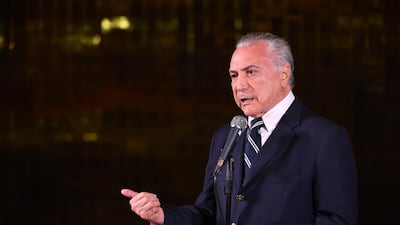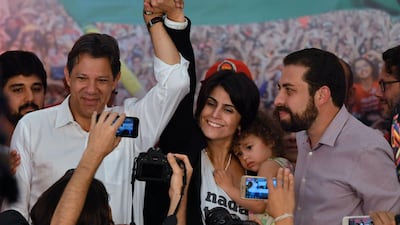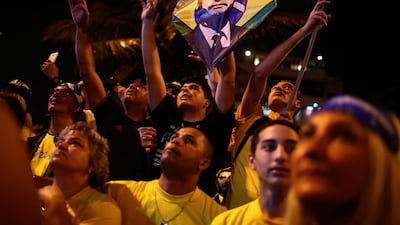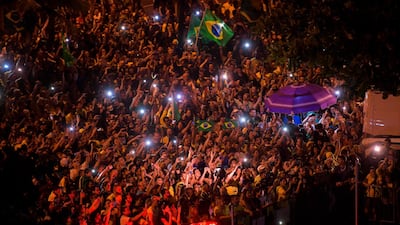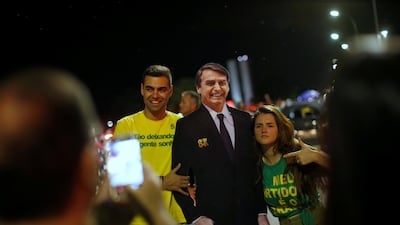Jair Bolsonaro won Brazil's presidential election on Sunday, marking a hard pivot to the right that promises to open up the resource-rich economy to private investment, strengthen ties to the US and unleash an aggressive crackdown on epidemic crime.
The former army captain beat Fernando Haddad, whose leftist Workers' Party became synonymous with graft, winning 56 per cent of the vote to Haddad's 44 per cent with almost all votes counted. His supporters thronged public places throughout the fifth-largest nation, celebrating with flags, music and fireworks.
“We couldn’t continue to flirt with communism and socialism. Now we will lead with God,” Mr Bolsonaro said in an address on Facebook. “Let’s together change Brazil’s destiny. We knew where Brazil was headed and now we know where we want to go.”
A little-known lawmaker for almost three decades, Mr Bolsonaro, 63, drew public attention with tough talk. He promised to suppress the nation’s lawlessness by meeting violence with violence, insulted minorities and women, waxed nostalgic for Brazil’s dictatorship and expressed doubts about the electoral process itself.
_______________
Read more:
Brazil's Jair Bolsonaro poised to win presidency in dramatic swing right
_______________
His unforgiving politics places him among nationalists such as Hungary's Viktor Orban, Rodrigo Duterte in the Philippines and Donald Trump in America. To many, however, he is the best hope to revive a moribund economy and streamline an inefficient state.
“The biggest risk is an erosion of democracy, though I’m not apocalyptic," said Michael Shifter, head of the Inter-American Dialogue, a Washington-based network seeking to foster democratic governance and economic development. “The opportunity is that he could stop the economic haemorrhaging.”
Since the height of Brazil's commodity-driven boom nearly a decade ago, citizens have seen millions of jobs evaporate, queues at hospitals grow and violence spurt to the point that more than 60,000 people a year are murdered.
For years, impatient voters have watched news reports of politicians and executives being caught with vast sums of taxpayer money in suitcases or Swiss bank accounts while roads and schools crumbled.
Mr Haddad, a former education minister in addition to running the nation's largest city, joined the race only after courts barred former president Luiz Inácio Lula da Silva following imprisonment on corruption charges. In the end, Mr Haddad was unable to overcome that tainted legacy as former mayor of Sao Paolo.
Mr Bolsonaro aims to thwart corruption and downsize a costly state by selling scores of state-owned companies. He would cut corporate and individual taxes to kickstart the economy and push structural reforms such as capping pension spending and simplifying taxes. All that helped drive a rally in Brazilian assets since his strong showing in the first-round election October 7.
His team of economic advisers, led by University of Chicago-trained Paulo Guedes, plans to slash import barriers, embark on new free-trade talks, and realign foreign policy more closely with that of Washington. If he succeeds, he could catalyse businesses in Brazil’s $2.1 trillion economy, the second-largest in the Americas behind the US.
“A lot of global money is going to look to Brazil, one of the emerging markets that has the best possibilities," said Hari Hariharan, chief executive officer at NWI Management LP in New York, which has been investing in Brazil since 1990. “If the fiscal situation is addressed, Brazil is going to be fantastic.”
It is a far cry from 2005, when the region's leftist leaders – Lula, Nestor Kirchner of Argentina and Hugo Chavez of Venezuela – rejected US president George W Bush and his free-trade proposal for the region at the Summit of the Americas in Mar del Plata.
Today, Lula not only sits in prison but his Workers' Party lost the presidential race for the first time since 1998. Many voters and investors alike supported Mr Bolsonaro less for his economic proposals than for his fierce anti-PT stance.
In fact, with crime, corruption and ethics having dominated the campaign debate, Mr Bolsonaro cannot assume widespread support for austerity and economically liberal reforms, said Alexandre Schwartsman, a former central bank director.
“He doesn’t have a mandate for a liberal revolution,” Mr Schwartsman said. “I’m not totally convinced of Mr Bolsonaro’s conversion to the liberal creed. You don’t undo 30 years of history as a statist in a fell swoop.”
Indeed, there have been signs that Mr Bolsonaro is dialing back some of the more ambitious plans proposed by Mr Guedes. This month, he ruled out privatising the core operations of oil giant Petrobras as well as the generation units of state power utility Eletrobras. Under pressure from lobbies, he may also water down plans to cut the number of ministries almost in half.
The key question will be Mr Bolsonaro’s ability to unify a deeply divided nation and to forge a majority in congress to pass austerity measures. A bitter campaign shook the underpinnings of a democracy that has existed only since 1985. Anger and political violence have surged and Mr Bolsonaro himself was stabbed by a fanatic in September and campaigned from his hospital bed.
While Mr Bolsonaro's Social Liberal Party surged in the October 7 congressional vote to become the second-largest force in the lower house, it still has only 52 out of 513 seats. And managing a ruling coalition will not be easy in a congress with 30 political parties.
While Mr Bolsonaro's party is likely to form a majority coalition, it still will not be easy to push through his agenda, said senator Fernando Bezerra Coelho, the majority whip in the upper house.
“There’s a hard core against reforms in the chamber, including some deputies from Bolsonaro’s camp,” said Mr Coelho. “He’ll have to negotiate.”


